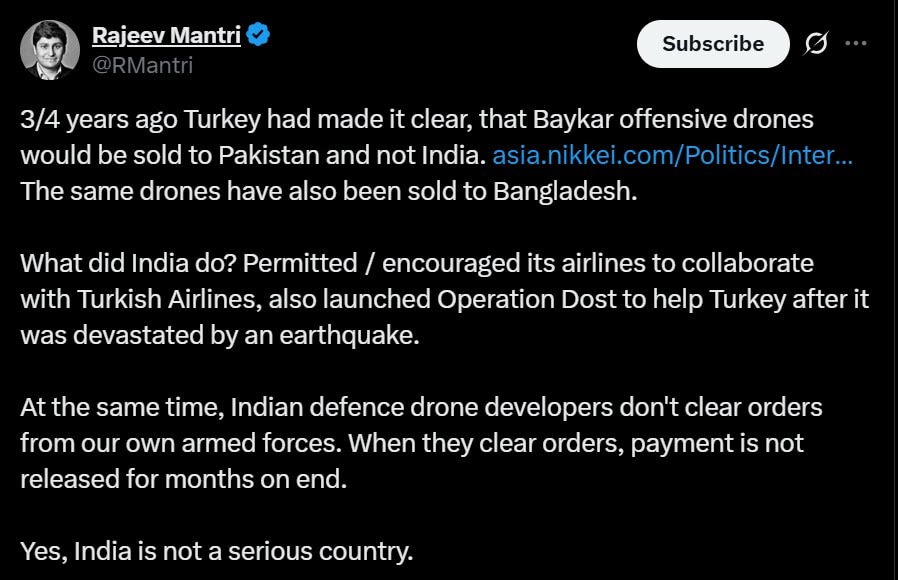By The Sampadak Express
India’s sustained commercial and diplomatic engagement with Turkey is drawing intense backlash from national security experts and foreign policy commentators, amid Ankara’s deepening defence ties with Pakistan and continued opposition to India’s position on Kashmir.
Criticism has intensified following revelations about Turkish Airlines’ substantial gains from its codeshare agreement with IndiGo, India’s largest airline. The partnership allows both carriers to jointly operate flights to over 30 destinations in Europe and the United States, but analysts claim the arrangement disproportionately benefits Turkish Airlines.
Sushant Sareen, Senior Fellow at the Observer Research Foundation, did not mince words in his condemnation. “India is not a serious country. We feed snakes and then wonder why they bite us,” he said. “We reward our enemies and treat our friends shabbily. Turkey benefits from us and openly stabs us in return.”

Echoing the sentiment, Rajeev Mantri, founder of Navam Capital, pointed to Ankara’s defence exports to Pakistan and Bangladesh, including the Bayraktar drones, while India continues to engage economically and diplomatically with Turkey. “India permitted/encouraged its airlines to collaborate with Turkish Airlines, even launched humanitarian operations like Operation Dost after Turkey’s earthquake while Indian drone makers await basic defence orders and delayed payments. This shows a lack of strategic clarity,” Mantri said.

The codeshare agreement between IndiGo and Turkish Airlines, active for several years, enables passengers to seamlessly book connecting flights across both networks. Major U.S. cities such as New York, San Francisco, and Chicago are included in the joint network. As of late 2024, IndiGo had similar deals with nine other international carriers, but the Turkish tie-up has become the most controversial.
The criticism comes on the heels of reports that six Turkish military transport aircraft landed in Pakistan last Sunday, reportedly delivering defence cargo. This followed a major terrorist attack in Pahalgam, Jammu and Kashmir, in which 26 civilians were killed. The attack was linked to Pakistan-based groups.
Turkey has been supplying Pakistan with advanced weaponry, including Bayraktar TB2 and Akinci drones. The two countries are also jointly developing the KAAN fifth-generation fighter jet. During a February 2025 visit to Islamabad, Turkish President Recep Tayyip Erdogan reiterated his country’s support for Pakistan’s position on Kashmir, calling for resolution in line with UN resolutions and the will of the Kashmiri people.
The diplomatic tilt has sparked calls within India to reassess aviation and tourism ties with Turkey. Prominent journalist Vikram Chandra questioned the popularity of Istanbul as a transit hub for Indian travellers en route to Europe. “Turkey, like China, is a consistent backer of Pakistan. Why do we keep rewarding that?” he asked, suggesting a pivot toward stronger relations with Turkey’s regional rival, Greece.
Former Foreign Secretary Kanwal Sibal went further, proposing a freeze in air connectivity: “We can consider suspending flights to and from Turkey for the time being,” he said.
As diplomatic pressure builds, the Indian government may face growing public calls to re-evaluate its approach to balancing strategic interests with economic partnerships.






